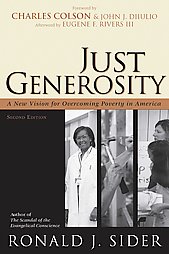
What follows is the final post in this series on Ronald Sider's book Just Generosity. It is a synapse of the third chapter, A Comprehensive Strategy.
A Policy Impasse
Progressives offer government as the answer to poverty. Conservatives offer family values and right conduct. The truth is a combination of these things. When Progressives openly attack faith communities and ignore the value of the family, and conservatives ignore the debilitating effects of unjust systems, some large corporations, and the potential of some government intervention, they both contribute to the reality of poverty in this country.
The Indispensable Role of Civil Society
Civil Societies are those things that are neither created nor controlled by the state. Things like families, churches, business, unions, and all the various non-profit and civil clubs the contribute to our culture. Sider argues that in addition to certain government regulations and programs that seek to alleviate poverty, as well as moral conduct by individuals; it is Civil Societies that have the greatest potential to overcome poverty. One of Sider's primary concerns is the strengthening of the two parent family. Those trying to function outside of the two parent family are far more likely to find themselves affected by poverty.
Beyond the family, all manner of institutions and organizations have the potential to help overcome poverty. Religious Organizations, Civic Organizations lite the Rotary Club, Businesses, Universities, Unions, they all have a role to play.
What both Sider and I do not want to see is the continued abuse of rhetoric by those on both the left and the right.
When conservatives say that the government should not do what the Church is responsible for, are they really prepared for their local congregation to raise approximately $500,000 annually, their share of what federal and state governments do for the poor annually.
When progressives, ignore the value of the two parent family, arguably the singe institution with the most potential to overcome poverty, and are openly agnostic, ignoring the contribution of faith communities, they are being incredibly naive, and downright harmful to our efforts to overcome poverty.
But what I find maybe most egregious, is the abuse and hoodwinking of conservative communities, namely evangelicals, by powerful interests that have money and power as their primary end.
While some progressives may be openly antagonistic toward people of faith, it is those Republicans that align themselves with Christians by speaking their language for the sole purpose of power and money that are the most evil in my mind. These powers want smaller government, (at least in some areas; the money making military industrial complex is not among them), and seek to create profits by exploiting the poor. There is an old saying about holding your friends close and your enemies closer, and that is exactly what some very powerful, and evil institutions are doing to faith communities. They speak our language, and trumpet our values, (abortion, family values, etc...) so that we don't poke our nose into their real interests. When did a government "for, by, and of the people" become the enemy? Well it is, for those that don't want the prying eyes of government regulation, the Biblical concept of justice, that would keep them from engaging in illegal and harmful activities that abuse the least among us, the people Jesus cared most about.
The Rest of the This Series
Just Generosity
What Does Poverty Look Like
A Biblical Foundation
Scripture On Poverty
2 comments:
Sadly I see very little difference between republicans and democrats in this area. The democrats are stepping it up. Trying harder then ever to sound like a Evangelical. Don't vote rehtoric. Vote what you have seen them do or not do. Shut up and act. I see a lot of talking and complaining about government and religion. If those that did all the complaining did took more action things might look a little better.
Sometimes democrats are sounding like evangelicals because they are trumpeting actual biblical values. (yes, sometimes they're not.)
Our last two presidents have actually done a fairly good job of living out good and/or biblical principles found on both sides of the isle. We know all about their failures. But what I like best is when a politician sounds or acts like his opposite. Clinton reforming social security. Bush greatly expanding money spent on education. Clinton balancing the budget. Bush, trumpeting the value of faith-based solutions to poverty.
Whatever a presidential candidate says to get elected, she can't help but be a reasonable person, a reasonable politician, and seek something resembling the common good. And that requires solutions from both the left and the right.
Thus far I like the "retoric" of both Obama and Huckabee, and particularly the ways they seem oriented toward a shared middle ground.
Post a Comment